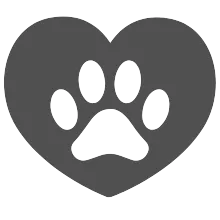Puppy Developmental Stages
Congratulations on your new puppy! Puppies are a blast! They're also a lot of work, right? No Worries, we're here to support you every step of the way!
Understanding what to expect as your puppy grows up will help you be proactive and ease you throught he inevitable rough spots to ensure that your new ball of fluff grows into a great adult dog that you will love and enjoy for years to come.

Early Puppy Development
Neonatal Period
Birth to 2 Weeks
Puppy can't hear or see well, stays close to mother and littermates. Smell, taste and touch are present from birth.
Transitional Period
2 to 4 Weeks
Eyes open, teeth appear, puppy begins to stand, walk with a wobble, even wag a bit. They begin to hear and will start to bark, they respond to taste and smell. By 4 or 5 weeks sight is well developed.

Primary Socialization Begins
Awareness Period: 21 to 23 Days
Puppy is able to use senses of sight and hearing, learning begins. It is a time of very rapid sensory development. A stable enviroment is crucial. It is important not to overload them. Radical changes in the environment be avoided. It is essential that the puppy remain with the litter and the mother. Exposure to new and novel stimulus should be very gradual.

Learning They're A Dog
Primary Socialization: 3 - 6 Weeks
Secondary Socialization: 6 - 12 Weeks
"This period is especially important for the development of stable emotional temperament and affective tone. Many social and emotional deficits observed in adult dogs are believed to result from removing puppies too early from the mother and littermates." ~ Stephan R Lindsay
Canine and Human Socialization: 3 - 12 Weeks
Puppy Learns species specific behaviors that makes him a dog such as biting, chasing, barking, fighting and body posturing. Learns to accept discipline from the mother and to use submissive gestures. Learns not to bite too hard. Learns to relate to other litter mates and develops a pack hierarchy through play.
4 - 8 Weeks:
Puppies are weaned, but mama should spend time with pups as much as she wants. Puppies require plenty of playtime with littermates, so they can socialize and learn from each other. Leaving the litter before 7 weeks can affect the puppies ability to get along with other dogs later and they will likely have trouble learning to inhibite the force of their bite, as well as other developmental deficits. Pups begin to discriminate where they eliminate, housetraining begins.
Each puppy should have individual attention from humans. Puppies should be given time away from their littermates for short periods to prepare them for eventual separation. They should also have opportunities to meet other dogs and people. This is a good time to begin simple training.
Puppies will learn social skills, social structure and ranking, appropriate play, physical coordination and canine communication through interactions with their littermates, their mother, and other adult dogs.
The puppy's curiosity and desire to explore increases and the rate of mental development will now depend on the complexity of their environment. By seven to nine weeks they're refining their physical skills and coordination (including housetraining) and the full use of their senses. Exposure to car rides and a variety of noises and different ground surfaces under their feet is important.
By eight to ten weeks they begin to experience real fear of new things, care should be taken to keep environmental changes minimal. Puppies going to new homes at this age need careful integration into their new home, with plenty of rest periods. Human interactions need to be calm, taking care not to overwhelm the pup.
By nine to twelve weeks they're refining reactions, social skills (appropriate interactions) with other dogs and are exploring the environment, spaces and objects.

Going To a New Home
Learning About the Human World: 7 - 12 Weeks
Puppies should be weaned at this point. This is the age when the most rapid learning occurs. The puppy's experiences during this time will have significant impact on future social behavior. The window of opportunity is closing! Although puppies can continue to learn to be comfortable with new things, it is not as easy as before. This is an absolutely critical period in which the puppy should be socialized appropriately. Care should be taken to ensure that the puppy is not overwhelmed and that exposure to new things, new dogs, and new people are positive experiences. Pups need assureance and encouragement, but not coddling!!
First Fear Imprint Period: 8 - 11 Weeks
Experiences a puppy perceives as traumatic during this time are generalized and may affect him all his life. It is a fact that a dog is most likely to develop an avoidance response if subjected to a physical or psychological trauma during these four weeks. This period falls within the human imprint period. Anything that frightens the puppy during this period will have a more lasting effect than if it occurred at any other time. Keep training fun, Use short sessions and keep everything positive. Gentle guidance and management are essential. Set your puppy up to succeed. This kind of mindset will enable you to be successful as you continue to socialize your puppy. Puppies should not be shipped during this period. Elective surgery should be put off until the 12th week, and necessary visits to the vet should be made fun.

Learning to Compete and Cope
Social Dominance Classification: 10 - 16 Weeks
Puppy has been in the home for approximately six weeks. This period is known as the "period of cutting teeth and apron strings." Pups will attempt to clarify and resolve the question of leadership. So long as you provide structure, control and leadership, this transition should be relatively painless. If these things have not been provided, all heck is about to break loose!
Your puppy will test it's wings. They may challenge you in an attempt to resolve the question of leadership. They may enjoy playing "keep away" with objects you don't want them to have and refuse to come when called. They may not play fetch even though they once did, or things of that nature.
During this period it is recommended to go back to the basics with training and continually reinforce good behavior and build desired behavior patterns. Use a long line outside if your pup is not coming when called. Even in the house, the pup should be wearing a 6 foot leash so that you can easily prevent them from getting into trouble. It's important to be proactive and patient, manage your puppy carefully just as you would a human toddler, to limit their options to practice undesirable behavior and guide them toward behavior patterns you want to instill. This is a good time to teach some fun training games!!
Puppies that have not been socialized and worked with take a different path in life than pups that have. Continued effort at socialization and training will pay off big in the future you share with your pup.
At this age your pup will be uncomfortable because their adult teeth are growing in. Be prepared with safe chewy items to help with your pups need to chew. Avoid overly processed chews like rawhides, these are notorious for upsetting your puppy's tummy and there is a risk of choking or intestinal blockage if your pup manages to tear up a piece and swallow it. Make sure anything you give your pup is large enough that they won't choke on it.

From Adolescence to Maturity
Flight Instinct Period: 4 - 8 Months
"Seems to forget everything previously learned."
~ How to raise a Puppy You Can Live With
Clarice Rutherford
Even if you have done all the things recommeded, it's likely your puppy will exhibit this to some degree. Be aware of it and ride it out. Keep your pup on a leash until this passes. This stage can last from a few days to several weeks and can occur anytime during this period. When you notice a change in your dog during this time, he is probably going through his "flight instinct" period. Like a teenager going through puberty, your puppy is changing psychologically. Your awareness of these changes in behavior will help get you through this commonly difficult period . As the saying goes, this too shall pass!
Second Fear Period: 6 - 14 Months
Many dogs will show a rise in their intensityl of reactions during this time. They may become protective and territorial or possessive, and may make renewed attempts to override their owners. In large breeds this period could extend longer since it is tied to sexual maturity.
Incidents may occur more than once and it often corresponds with growth spurts. Therefore it may happen more than once as the puppy matures. Your dog may suddenly be apprehensive about new things or shy or timid of new people or situations. Most of height growing is over, but pup will start to fill out over the coming year. Puppy begins to mature sexually: males begin to lift leg, and females have first heat period anywhere from 6-12 months.
A single frightening or painful experience during this fear period can have a lasting impact for the rest of your dog’s life. It's important to be your dog's advocate in new situations, letting them know that they are always safe with you.
Don't coddle your dog when they are insecure, model a firm, confident demeanor to help them work through their concerns. It's ok to pet your dog and to reassure them, but your demeanor should communicate to them that all is well and there is no need for concern. Use a confident, normal voice, not high pitched baby talking. A supportive, yet unconcerned reaction from you teaches them their fears are unfounded.
If your puppy appears apprehensive, be patient, avoid force and confrontation. Build confidence by working them through it and training. Avoid any potentially overwhelming circumstances you cannot personally oversee, such as shipping your pup in the cargo bay of an airplane.
Maturity: 1 - 4 Years
Are you done socializing? NO! Like your training efforts, which continue on into adulthood and throughout your dog’s entire life, you are never done with socialization. He still needs to meet and greet people, go places with you, and continue to share your world and your experiences, if you want him to continue to be the happy, friendly dog he is today.
Your dog is not yet full grown, merely capable of reproduction. Smaller dogs mature earlier, larger dogs later. It is recommended that your pup remains crated or safely contained when you are not available to supervise his behavior. You will know when your dog can be trusted by testing him for short periods (10 - 30 minutes) while you leave the house. It's very helpful to have a camera on to monitor your dog's reaction to you leaving. If your dog is damaging property while loose, he is not ready!
As your dog continues to full maturity, especially between 18 months and 3 years old, they will begin to adopt a new, more mature attitude toward their world, especially new dogs. If you were lax in your work earlier on, you may now see some things you have missed: object guarding, unfavorable reactions towards unfamiliar people, animals, or things that your dog missed during the socialization stage. Always be careful to introduce your dog to new dogs and people slowly and carefully. Don't allow strangers to interact with your dog randomly. Regardless of weather or not your dog is very socially attracted to others, teaching your dog to mind their own business and be connected with you will go a long way toward helping them grow into a happy, socially appropriate dog.
